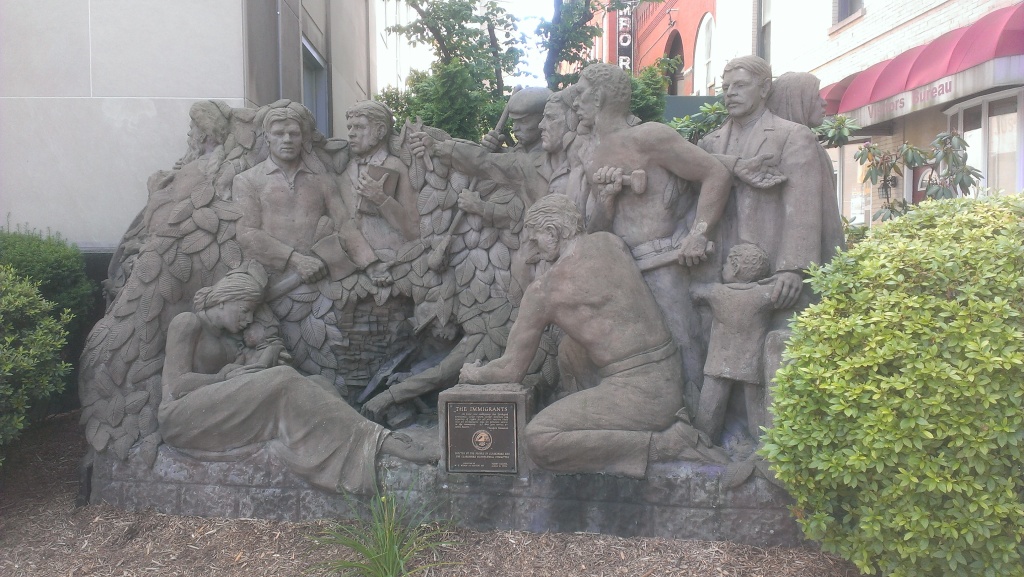Note: This is the Introduction of my memoir, “Block Party Summers: The Joy of Growing up a West Virginian”
I grew up from the mid-1950s through the early 70s in Clarksburg, an energetic and industrious city in North Central West Virginia. During my childhood, I experienced a culturally rich community which was home to a great diversity of first- and second-generation immigrants from all sections of Europe and the British Isles.

My own family, however, traced its roots back to early American pioneers. My dad’s side of the family is directly descended from Morgan Morgan, the first European settler of what is now West Virginia. His son, Zackquill Morgan, founded Morgantown, best known today as the home of West Virginia University.
Mom had a different history, but still very much in the pioneering spirit. Her mother, whom we called “Granny Red” and whom you’ll get to know later on in the book, struggled as a single mother with three children during the Great Depression. Her resilient, determined attitude was passed down to my mother, who relentlessly pushed my sisters and me to always give and be our best! Women – of all ages – were very much at the center of my life.

For the most part, and definitely for those very formative years of childhood, we lived at 100 Hudson Street, in the Goff Plaza neighborhood of Clarksburg. My experience growing up contradicts the stereotypes of what many people hold to be “family life” in the Mountain State. What I experienced were loving, hard-working, hard-playing, sometimes hard-drinking, but always, joyful family and friends. Our home on Hudson Street was everyone’s home. While there were five in our family – Dad, Mom, my older sister Mickey, younger sister April, and myself (the unfortunate boy-child in the middle!), there were rarely that few people in our home. It was more like an ongoing party, stretching from the cobblestone street at the curb, through the house, down the stairs, into the back yard, and down to the “lower” back yard. This lower back yard, which was wooded with spring-fed ponds and ended at the shore of Elk Creek, affectionately became my own personal childhood hideaway.
One of the things which our folks instilled in us was the joy of experiencing West Virginia’s extensive natural beauty by regularly visiting any number of the state’s many parks and forests. While experiencing the natural beauty of West Virginia was integral to the joy of my childhood, my earliest, most dominant, and enduring memories are of people. I was captivated again and again and again as I sat on the front porch listening to the stories my folks and their friends told about their lives, especially their escapades with their siblings. Both my grandmothers told stories of times I still cannot even begin to fathom. Uncles and aunts, to a person, were full of stories. I heard from my great-aunt the story of how her brother escaped from a prisoner-of-war camp in World War II. I heard of her husband, my great-uncle (and Granny Red’s brother) buying a car based on how well he could stash and hide his liquor from my great-aunt.

The stories never stopped! And neither did the gatherings. Indeed, it was the annual summertime neighborhood ritual of having a block party that offers the inspiration for this book.
Everybody in the neighborhood came. The party stretched from both ends of Concord Avenue, down Hudson Street and on down the hill to the field along Elk Creek where we played volleyball. Considering there were about 20 or so families participating, setting the date was done before everyone decided when they would be going on their own vacation. Most families generally went to the same place – Myrtle Beach – which you’ll read more about a little later.
Long story short, the memories of what I experienced and enjoyed at those boisterous all-day gatherings of neighbors and friends in Clarksburg is at the heart of what it meant for me to grow up a West Virginian. Why that is important was stated expertly roughly a century ago by the highly respected West Virginia historian, Dr. James Morton Callahan:
“Biography has historical value when it touches the common or community life or presents typical facts illustrating conditions of community life.”1
Dr. Callahan was correct. These stories must endure, just as the people who lived them. It is the driving force behind my compulsion to share these memories of people in my early life who taught me, both by word and example, the essential human values of goodness, faith, perseverance, joy, sharing, compassion, and most of all, what true love is all about.
So, as you read these stories, recounted by a simple “Mountaineer pensioner,” it’s my hope that you, too, will be inspired by, and perhaps rediscover for yourself, the values that Dr. Callahan described as “…illustrating conditions of community life.”
1 James Morton Callahan, History of the Making of Morgantown, West Virginia (Morgantown, W.Va.: West Virginia University Studies in History, 1926), p. 77. This signed book is of particular significance to me, as a copy of it was given to Dad by Dr. Callahan, apparently at the urging of my great-grandfather. Dad was born in 1926, the same year the book was published. In it, Dr. Callahan wrote, “To Mathers Barrick grandson of Max Mathers with best wishes of the author Jim Callahan May 31, 1947.”

© Michael M. Barrick, 2024

[…] Block Party Summers: The Joy of Growing up a West Virginian […]